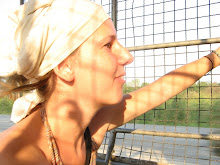I am in Banda Aceh in the north of Sumatra, Indonesia. The biggest part of this city is new, rebuilt after the Tsunami came on the 26th of December 2004. It is easy to go around without witnessing its past. As an outsider I see a façade. The buildings don’t look so new. Everything looks normal.
My friends who work and live here take me behind the façade. It is a very big backstage. I get lost and hardly understand the signs on the walls, the reason of the curtains or the feelings the loud voices coming from high towers awaken among the many actors.
Aceh is a place recovering from a natural disaster and from an armed conflict. An enormous amount of money, foreign aid workers and compromises with Jakarta (Indonesia’s capital) have shaped today’s environment. Close to unbelievably beautiful beaches for example the Turkish constructed houses. They are basic simple and build in a structured order, marked with a Turkish flag. Many of them are empty. Lieselotte explains how some donors gave a house for every tsunami victim. Children, bachelors, widows, everybody got one house. Many Acehnese however don’t want to live near the sea anymore. Other areas were rebuilt by different donors. Different policies resulted in Tsunami victims who lost everything living in different houses than people who had some minor damages. Some Tsunami victims still haven’t received a new house while others who were not a victim (depending whose categorization you use) did. Clearly there were some misunderstandings with the lists of victims. The quality and size of the houses differ significantly and feed resentments.
A research revealed that the tsunami money was five times bigger than the Marshall help per capita. Often it is said that there is too much money here. The unemployment however is big and for sure things can be improved but ‘left-over’ donor money goes to ‘easy’ infrastructure projects or luxurious accommodation during NGO trainings. This is more a result of the stringent guidelines of donors than of the project implementers.
Banda Aceh is not an easy place. It is not an easy place to live neither to understand. The city is not half empty because former conflict refugees returned. Islamic oriented rules refrain people from saving money and leave them a choice between investing and donating to the poor. Alcohol is prohibited but marihuana is mixed in wedding dishes. Watching others and commanding respect through materialistic status symbols is activity number one among the ‘lazy’Acehnese. Employers who want a more reliable workforce hire Javanese.
The conflict goes back to the independence struggle against the Dutch, the discovery of oil and gas by Exxon Mobile, its ‘military protected’ profits going to Jakarta, a dictatorship oppressing freedom, including religious and cultural freedom and a lack of local leadership when the central power collapsed.
I can’t help it but thinking of Burma. When will the survivors have houses? Will this continuous disastrous attitude of the Junta lead to its collapse? Could the financial and reconstruction aid for the Nargis victims be handled better than the Tsunami money? Could it also provide homes for all those internally displaced people whose villages were burned by the military? Who will provide houses for all those million refugees living abroad? In Aceh evidence of human rights abuses was lost when Tsunami victims were dumped in previously existing mass graves. Will the Junta blame Nargis for all the poverty and abuses? Can the foreigners break through the wall? Will foreigners finally also know that a promise from the military regime doesn’t mean anything? When will the people of Burma know what is happening in their own country? When will my friends be free?
Wednesday, May 28, 2008
Subscribe to:
Post Comments (Atom)


No comments:
Post a Comment